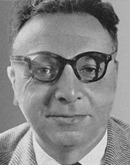

Eugène Beaudouin
*20. 7. 1898 – Paris, France
†14. 1. 1983 – Paris, France
Biography
Eugène Élie Beaudouin was a modernist French architect and urban planner. He studied architecture in the studio of Emmanuel Pontremoli at the Paris École des Beaux-Arts. In 1928, he won the Rome Prize, which allowed him to stay at the Villa Medici in Rome from 1929 to 1932 and undertake study trips around the region. He was interested in collective housing, prefabrication of buildings, and the industrialization of construction. In addition to close collaboration with architect Marcel Lods, he also had contact with engineers Vladimir Bodiansky and Jean Prouvé. As early as the 1920s, he created urban projects for La Havane (1928) and La Muette (1935). After World War II, he focused on the reconstruction of damaged cities such as Marseille, Toulon, and Montpellier. In 1951, he won a competition for the reconstruction of the cities of Rotterdam and Strasbourg in government projects aimed at developing rapid methods of building industrialization. He was the head of the School of Architecture at the University of Geneva and from 1946 to 1968 served as a professor at the Paris École des Beaux-Arts, where his students included figures such as Fernand Pouillon and Christian de Portzamparc. From 1958 to 1966, he was president of the French Association of Urban Planners (Société française des urbanistes) and from 1958 to 1966, he was president of the UIA (International Union of Architects).
Eugène Élie Beaudouin was a modernist French architect and urban planner. He studied architecture in the studio of Emmanuel Pontremoli at the Paris École des Beaux-Arts. In 1928, he won the Rome Prize, which allowed him to stay at the Villa Medici in Rome from 1929 to 1932 and undertake study trips around the region. He was interested in collective housing, prefabrication of buildings, and the industrialization of construction. In addition to close collaboration with architect Marcel Lods, he also had contact with engineers Vladimir Bodiansky and Jean Prouvé. As early as the 1920s, he created urban projects for La Havane (1928) and La Muette (1935). After World War II, he focused on the reconstruction of damaged cities such as Marseille, Toulon, and Montpellier. In 1951, he won a competition for the reconstruction of the cities of Rotterdam and Strasbourg in government projects aimed at developing rapid methods of building industrialization. He was the head of the School of Architecture at the University of Geneva and from 1946 to 1968 served as a professor at the Paris École des Beaux-Arts, where his students included figures such as Fernand Pouillon and Christian de Portzamparc. From 1958 to 1966, he was president of the French Association of Urban Planners (Société française des urbanistes) and from 1958 to 1966, he was president of the UIA (International Union of Architects).
The English translation is powered by AI tool. Switch to Czech to view the original text source.








